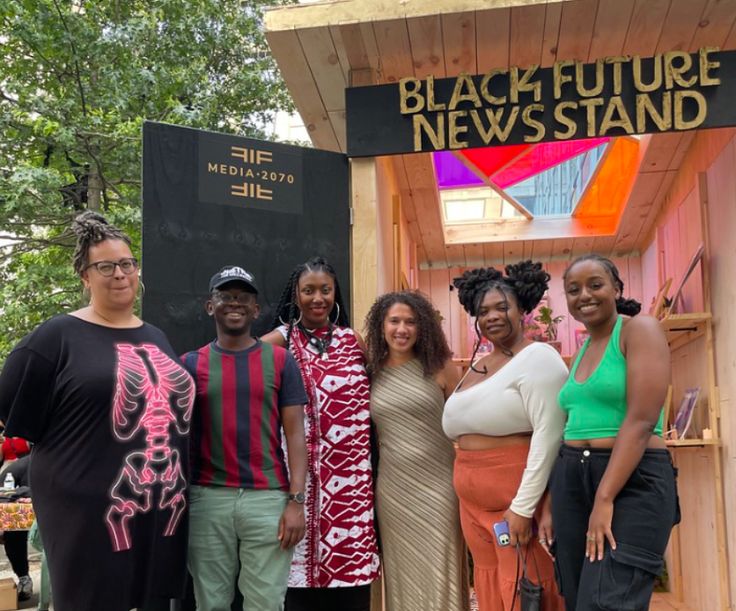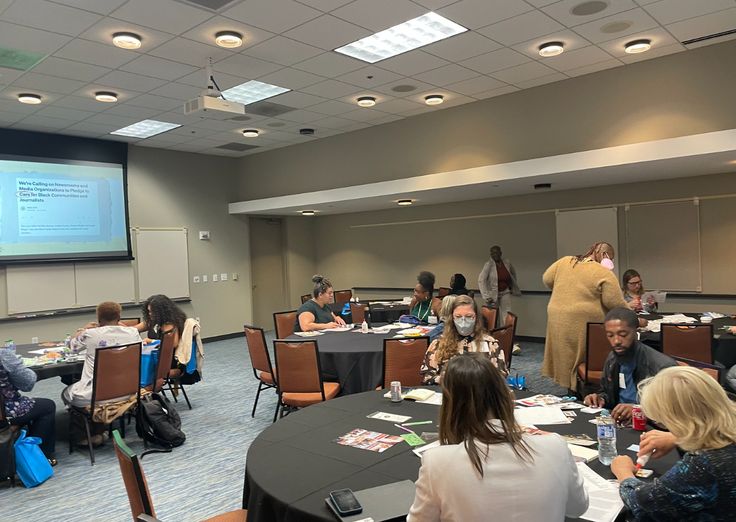Dozens of Black news publishers gathered last month for an annual convention where the 2024 presidential election and voter turnout were a top concern, but in other conversations, journalists raised issues about the state of the media landscape.
Black-owned newspapers like the Michigan Chronicle, The Afro and The St. Louis American were represented at the National Newspaper Publishers Association’s (NNPA) national convention in Baltimore, Maryland. The organization, which serves as the trade association for over 200 Black-owned media companies in the United States, was founded in 1940 and has, for decades, covered stories and issues in the Black community that mainstream newsrooms would ignore.
The conference’s theme centered on increasing voter engagement and turnout as the presidential election nears. However, their efforts have been complicated by online accounts creating and amplifying election disinformation that targets Black audiences, according to a new analysis.
With newsrooms shuttering nationwide at stunning rates and audiences turning to other, sometimes less reliable, sources for news, Black publishers are fighting for survival.
Larry Lee, president and publisher of the 62-year-old Sacramento Observer, said he has seen substantial growth in his paper’s audience, staff and revenue since a major website redesign and the adaptation of new media tactics. Still, he remains concerned for the future of Black journalism.
“This moment that we’re in is a little perilous because there’s been a stagnation of growth for everyone across the board the last year,” said Lee, who traveled from Sacramento, California, to Baltimore for the convention. “So, while there’s been some growth over the last few years, the last year has been a bit of a warning shot across the bow about where we are and our abilities to continue to grow audiences.”
Media reparations may be the key to solving some of the problems facing the Black press, according to the media advocacy organization Free Press. Media reparations examine how the American media industry has harmed Black people and seeks redress from those institutions by providing greater funding and directing resources into Black-led newsrooms and media companies.

During the so-called racial reckoning of 2020, Black Caucus at Free Press launched Media 2070, an initiative that began as an anthology of essays detailing the history of the media’s origins in racism and slavery — like running ads for enslaved persons, for example — and the importance of media reparations.
“We’re a consortium of journalists, media makers, artists, healers and educators that are working to change these power structures so that Black people have the resources, the power and the space to be able to own our stories, all the way from ideation to creation and through distribution,” said Diamond Hardiman, reparative journalism manager at Free Press.
The media industry has a long, fraught history of racism that it has yet to answer for. Local newspaper coverage contributed to a white mob’s 1921 destruction of the Greenwood neighborhood in Tulsa, Oklahoma, and several newspapers ran editorials supporting segregation. Isabel Wilkerson, the first African American woman to earn a Pulitzer Prize in journalism, wrote about how newspapers were used as vehicles to push anti-Black violence and racism.
“Newspapers were giving Black violence top billing, the most breathless outrage reserved for any rumor of Black male indiscretion toward a white woman, all but guaranteeing a lynching,” she wrote in her 2010 book “The Warmth of Other Suns.” “Sheriff’s deputies mysteriously found themselves unable to prevent the abduction of a Black suspect from a jailhouse cell. Newspapers alerted readers to the time and place of an upcoming lynching.”
Those impacts reverberate today. Media 2070 lists some of the ways the government worked to suppress the Black press and how the Federal Communications Commission (FCC) issued the first broadcasting and TV licenses to white men and white-owned companies only during the Jim Crow era. Today, African Americans own less than 1% of the country’s TV stations, according to a report by the FCC.
The organization aims to see the complete transformation of the media industry by 2070.
The media reparations movement may seem like a pipe dream for Black publishers, who need resources now and aren’t necessarily thinking decades into the future. But the Media 2070 team knows the transformational change they hope to achieve will not happen overnight.
“Media reparations is as much about the process that we take to get to repair as much as it is about the destination we’re talking about in 2070,” Hardiman continued. “Part of that process is investigating what it looks like to have infrastructure that can respond to harm better or what it looks like to create cultures of care in newsrooms, which is part of the work that could and would impact Black-owned press.”
The Media 2070 team has already worked with the Black press in this endeavor, having collaborated with the New York Amsterdam News, one of the country’s oldest continuously run Black newspapers. “That was a beautiful exercise, and seeing how the future and present and the past can all come together and collide in a meaningful way,” said Venneikia Williams, campaign manager for Media 2070.
“We’re not at odds. It can be a partnership.”




The idea of reparations has been thrust back into the spotlight in recent years due to the efforts of a reparations task force in California and an initiative in Evanston, Illinois, that focuses on housing grants.
Lee is hopeful that media reparations can help spread awareness about the disparities within the media industry, such as California’s only three Black-owned radio stations — in the entire state.
“If the media reparations movement can provide that platform and can bring the proper stakeholders to the table, then perhaps there’s some assistance that they can provide toward more equity to Black-led and Black-owned media outlets around the country,” he explained.
But Black newsrooms have faced challenges for decades, and he pushed back against the idea that they need a savior. The media crunch, while concerning, is really nothing new to the members of the National Newspaper Publishers Association.
“I don’t want to suggest that the Black press needs saving, but it does need support and investment,” the publisher said. “Black newspapers have not folded over the last five to eight years at the same rate as mainstream newspapers. We have some resiliency as Black newspaper owners and Black-led newsrooms.”


